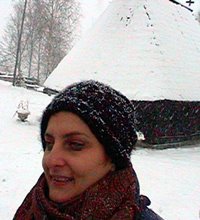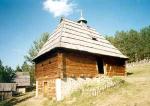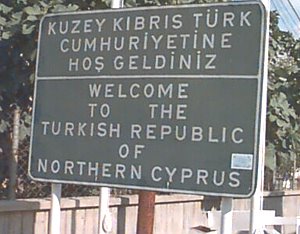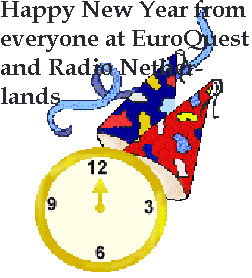EuroQuest EuroBlog
This blog is the homepage of Radio Netherlands European Affairs Magazine "EuroQuest". Stop by each day for articles, discussions and musings from program producer Jonathan Groubert.
Saturday, December 31, 2005
Tuesday, December 27, 2005
Our Advice for 2006: Enter Whining!
 At left, Jose Bove, French farmer and eco warrior. Love him or hate him, he personfies this week's EuroQuest theme. Yes, this week's show is one major rant after another. From GMO food to the Nanny State to ad campaigns to make Germans more pleasant to one another (a thankless task), we advise you to enter the New Year scowling. Erm....Enjoy!
At left, Jose Bove, French farmer and eco warrior. Love him or hate him, he personfies this week's EuroQuest theme. Yes, this week's show is one major rant after another. From GMO food to the Nanny State to ad campaigns to make Germans more pleasant to one another (a thankless task), we advise you to enter the New Year scowling. Erm....Enjoy!
Segment 1 Mutant Maize
Jose Bove is the French cheese farmer who gained notoriety in 1999 when he and others destroyed a McDonald’s restaurant in
Remember the 60s? Remember the heady days of the anti-globalization protests that gave people like Jose Bove a platform? Just cast your mind back to the situation in
They call
As we all know, national stereotypes abound. French are often seen as arrogant snobs, Americans as overweight bumpkins or grinning optimists. Germans, on the other hand, are often viewed as stiff, dour, and very serious. It’s a stereotype so pervasive that even many Germans believe they could use a change of attitude. An ad campaign has been running on German TV lately to get people to lighten up, stop complaining and to stop and smell the roses. And it may be working, as Kyle James reports from
When you have a rumble in your stomach, do you conclude it must be stomach cancer? Or if your heart beats fast, you are suffering a heart attack? Then you could be a hypochondriac. It might be a much-ridiculed condition, but in
Tuesday, December 20, 2005
A Bosnian Christmas Carol
 To the right is Svemirnka (Minka) Mijatovic, my wife's sister (actually her cousin but they don't make such petty distinctions in the Balkans). Behind her is the tiny log cabin church that is the goal of the story below. It is called A Bosnian Christmas Carol, two sections of which have been encoded into Windows Media Format for your viewing pleasure. I hope you enjoy the story below and Merry Christmas!
To the right is Svemirnka (Minka) Mijatovic, my wife's sister (actually her cousin but they don't make such petty distinctions in the Balkans). Behind her is the tiny log cabin church that is the goal of the story below. It is called A Bosnian Christmas Carol, two sections of which have been encoded into Windows Media Format for your viewing pleasure. I hope you enjoy the story below and Merry Christmas!On January the 6th 2003 or Orthodox Christmas Eve, I took part in a few Christmas rituals with my wife and her family near the little village of Susnjari, just outside of Banja Luka, the capital of the Bosnian Serb Republic.
My wife Dragana, her father, uncles, her English-speaking cousin Minka and I made our way through Susnjari towards the mountain. It was dark, it was cold and it was starting to snow.
As we walked through the village, we stopped at every house. The brothers Mijatovic would start shouting and out would come the men. Hidden stashes of slivovitz were revealed, all drank one shot and we moved onto the next house where this would be repeated.
We did this maybe ten times before we got to the foot of the mountain. Now it was colder, the snow was falling harder and I was drunk. I asked Minka: How long will it take to get to the top? A half an hour, she slurred. And I just knew she was lying.
So we’re fighting our way up this mountain in what has become ankle deep snow. To my astonishment, more people were joining us at every new path. We must’ve been about 50 at one point. And now we’re getting hot and sweaty from the work. And people are laughing and joking and I’m starting to have fun when… of in the distance… I heard baddah baddah baddah pow!!!
“Jesus Minka”, I whispered. “What’s that? It sounds like gunfire.” “Oh it is.” she replied, “Somebody is celebrating Christmas.” “Will they have guns at the top of the mountain?” “Oh no, they’re not allowed to bring them. Well not anymore!”
An hour and half later we reached the top. I thought I heard more gunshots, but it turned out to be kids lighting firecrackers. And there were hundreds of people huddling around a tiny log cabin that could hold maybe 10 people…tops. It seemed that almost everyone had made this arduous, cold difficult journey, up the side of a mountain, in a snowstorm, in the dark, to get to a church so tiny, you simply can’t get in. When the service and auction had ended, some of us moved to the cabin next door. There was many a hearty pat on the back and the greetings of people who only get to see each other once a year, surrounded by alcohol laden halos of breath. And then, magically, my father in law started to sing.
You can click here to see the singing in wmv.
After about an hour, the singing stopped, more out of exhaustion and intoxication, I think. Everyone shook hands and we headed back down the mountain where the whole thing happened in reverse.
Click here to see Minka explain the end of the ritual in wmv.
One party would break off from the rest to head down a different path. We would all stop and sing a song with me pretending to know the words. We all had one shot of brandy, and, in a spirit of genuine brotherhood, go our own way.
When we reached the edge of the village, we were all drunk, wet, cold, hungry and…frankly…exhausted. We hurried home anticipating the gigantic Christmas meal we not only knew was awaiting us, but that we had earned. But then the brothers Mijatovic suddenly stopped in front of a white house and started discussing something in hushed tones I couldn’t understand.
They stopped talking and counted down: three, two, one. And they started singing a soft, kind of sad carol in perfect two-part harmony. And then, a chubby, middle-aged lady with badly dyed blonde hair peered out of the houses front window. She saw the men singing and squeezed her hands to her cheeks. She listened for a minute and then went away.
When she reappeared, she was plowing her way through the knee-deep snow, nearly knocking over the slivovitz bottle and little cups she had placed on a serving tray, laughing and calling to us and panting and, and…she was crying. Minka leaned over to me and whispered, “This woman is a refugee. She lost her whole family when the Croats chased the Serbs out of Krajina. Her husband and son are dead and she’s all alone.” The Mijatovic’s held out their arms and shouted to her. Ho, Ho.They hugged her and she kissed them. She poured us all a glass and we made a toast, “Zivjeli” - To life. And as the brandy burned my throat thought, I thought “Wow, now this is Christmas.”
Monday, December 19, 2005
The True Meaning of Christmas - Bosnian Style

A Bosnian mountaintop cabin quite similar to the one featured in segment 1 of this week's program.
Want more explanation of the term Badnjak? Click here.
I'm back!!!!! Wow, the Egyptian Red Sea is fabulous. I highly recommend it to anyone looking to escape the winter blues. I acutally swam with a dolphin. Enough!This week's program is the traditonal EuroQuest Christmas special including a 13 minute long featurette where I learn the true meaning of Christmas after a sojurn up the side of a Bosnian mountain. Later this week I'll encode some of the video mentioned in the piece as proof I was really there. In the meantime, the audio is up in high quality. Enjoy! And...oh yeah...Happy Hannukah.
Segment 1: A Bosnian Christmas Carol 13:35
Jonathan Groubert follows his Bosnian in laws up a mountain to take part in a Serbian Orthodox tradition, he just wanted to please his father in law. But when he got there, he discovered the true meaning of Christmas.
Segment 2: Italian Cheer (Beer) 5:27
Italians first started experimenting with beer-making in the mid-Nineties, and over the last few years, specialist craft breweries have been springing up all over Italy. Dany Mitzman caught up with the director of the Italian Union of Brewers, Lorenzo Dabove.
Segment 3: A Norwegian Christmas Treat: Sheep’s Head Soup 5:11This next piece takes us to the municipality of Voss, where nothing beats a smoked and boiled sheep’s head, served whole. Lars Bevanger, truly a brave man with a strong stomach, sampled some for EuroQuest.
Click here to download the program in high quality.
Wednesday, December 07, 2005
Living Apart Together Part 2

I'm on vacation this week, so no time to comment. Back in the office and blogging away next week Monday. Until then, enjoy this red hair.
Segment 1: French ‘Grande Ecole’ Recruits Minorities 5:23
Five years ago France’s Institute of Political Studies decided it was time to change the resolutely white, upper class profile of its student body, and reach out to the untouchables of French society. Frank Browning filed this profile of the Institute.
Segment 2: Colonial France Rehabilitated 4:38
French colonialism still has repercussions to this day. After all, many of the young men burning cars in the French suburbs were the sons of immigrants from the former empire. So, should France be proud of its colonial past? Nick Champeaux reports.
Segment 3: Germans Have Hard Time Integrating to Holland 4:16
Mira Peeters from the University of Nijmegen wrote her doctoral thesis on the integration of German immigrants. She found that most Germans have a hard time feeling Dutch, and that the Dutch themselves aren’t really helping. Thijs Westerbeek reports.
Segment 4: End of the Red Head? 5:38
Can it really be true that, as a result of migration and ethnic mixing, there will be no redheads in 50 years time? Kathy Clugston spoke with dr. Eric Sistemans.
Click here to download this week's program in high quality!
Living Apart Together

We're "Living Apart Together" in this week's EuroQuest....or alongside or in parallel or whatever. The point is...we are not actually communicating or commisserating or whatever.
Take Cyprus. That island has been divided since 1974. It seems that, for some, this division has become a state of being and end in itself, rather than a temporary blip in the island's long history. While it seems most on both sides want to see this state of affairs ended, Cyprus is proof that a status quo is hard to shake loose.
But, sometimes, an odd but outstanding event comes along that makes people think and adds to the drumbeat for change. One of those events is in this week's EuroQuest.
Listen and enjoy.
5:43 Segment 1 - The Last Yugoslavs
Jonathan Groubert tells the story of his first visit to Belgrade and an ethnically surprising tour of the biggest Orthodox church in the Balkans.
7:50 Segment 2 - Turkey’s Armenian Orphans
Dorian Jones goes with a Turkish filmmaker as she researches the history or of one of those orphans -- her grandmother.
6:34 Segment 3 - Cypriot Musical Colloboration Unites Divided City
The Mediterranean Island of Cyprus has been divided ever since the Turkish invasion of the island in 1974. It is precisely this divide that was the subject of a recent musical collaboration between Greek and Turkish Cypriot musicians. Tabitha Morgan was there.
4:09 Segment 4 - French Boarding School for Kids from the Projects
Ever since the riots, much thought has been given to what can be done about the ennui amongst the immigrant youth in the French housing projects. One solution is boarding schools for the poor. John Laurenson reports from Lyons.Please click here to download the program.
Podcasting? We do it at iTunes, Podnova
and Yahoo.As always, you can leave comments below.
Monday, December 05, 2005
The Last Yugoslavs

To the right is a picture of St. Sava. This, I'm told, is the largest Orthodox Church in the Balkans and is the subject of a little piece I made recently called "The Last Yugoslavs". The Public Radio Exchange made it this week's "Pick of the Week" and editorial board member Marjorie van Halteren said "Straight from the heart, nicely done."In April of 1996, I went to Belgrade. The war in Bosnia had just come to an end and my wife Dragana, who is from Banja Luka, Bosnia, went to see her family there for the first time in 4 years. As you could imagine, it was an emotional reunion.
Below is the entire text, which, I believe also makes nice reading.
Click here to listen to the radio version of the piece. It's only 5'43"
The atmosphere in Belgrade was charged. Slobodan Milosevic was still in power, the old Yugoslavia was dead and war was in the air. And there I was, a tourist in the city on the edge of an abyss. Dragana’s two cousins, Svemirka and Goca, decided that I should see something of the city. So off we went to what they claimed was the largest Orthodox Church in the Balkans. The bus was sweltering. All of Belgrade smelled like sweat and exhaust. It had once been rich, but now it was poor, desperate, slightly beaten and resigned to more beatings. The people looked busy, going to work or to cafes. But they also looked, I don’t know, somehow lost.
And there it was, Saint Sava. It’s heaving domes not really elegant, just very big. A swollen white and grey carbuncle in the city center. And it looked closed. Could we go in? Should we? Should we say that I was an American? After all, the Americans had just bombed the Serb Army in Bosnia. I didn’t think I’d be, you know, popular.
We found an open gate and walked to the little vicary next to the church. A painfully thin young man of about 25 was sitting, reading a newspaper and perspiring in his gray polyester suit with a thin, black tie, his white shirt transparent from sweat. He said his name was Slobo. Goca and Sverminka told Slobo I was a visiting American of Serb decent and that we wanted a tour of the church. Slobo said he spoke English, nodded and, unsmilingly, led us inside for a big surprise. The largest church on the Balkans was nothing but an empty shell.
It seems that they’d been trying to finish the church for the last 80 or so years but, every time they were just about to start again, war would break out and they’d have to stop. Slobo robotically led us through the building, told us the statistics: how high, how big, what kind of stone it was made from and then he led us out. As we past the vicary he turned and, strangely, dropped his formality and asked us inside for a drink.
We sat at the table of a large room and were given tiny glasses of powerful plum brandy, slivovic. Slobo looked at me and asked, do you play piano? No, sorry. I do, he said, and he walked over to the upright piano next to the table. And then he started to play.
The music was both joyous and sad. My wife and cousins started singing along with Slobo, word for word. And then he said, do you know this song from the mountains of Macedonia? And they did, and they sang, and they drank and off came Slobo’s jacket. And then he said, do you know this song old Bosnian drinking song, and they did and they drank and they stood on their chairs with their arms in the air and off came Slobo’s tie. And they kept on singing and dancing and drinking and laughing. And then Slobo stopped playing.
And he said, “Do you know, we had the best country in the world? We had freedom and money and a hard currency, but we didn’t have to work hard like you in the west. We had good lives. We had the best from the east and the west and we destroyed it.” “Do you know, I am not from Belgrade. I am from Croatia. I was here when the war started and I got stuck.” “I am from Dalmatia.” “Do you know this old Dalmatian fisherman’s song?” And he started to play…
They knew the song. And they sang and they drank until they wept. They all wept for the country they had lost. The Croat, the Serb and Bosnians all wept, for they were no longer countrymen, and yet they were, at least for tonight, still bound by the memory of what was and what could have been, and by this music. They we’re singing as if they were the last Yugoslavs on earth.
Later that night, we went to dinner. Slobo got into a fight with a gypsy band that wouldn’t play an old Yugoslav song. Then he got drunk, passed out in his soup and ruined his suit.

